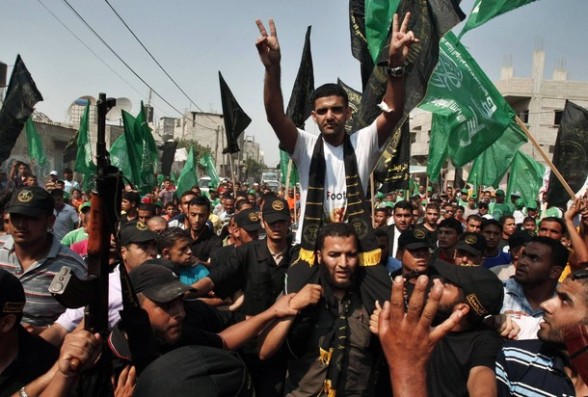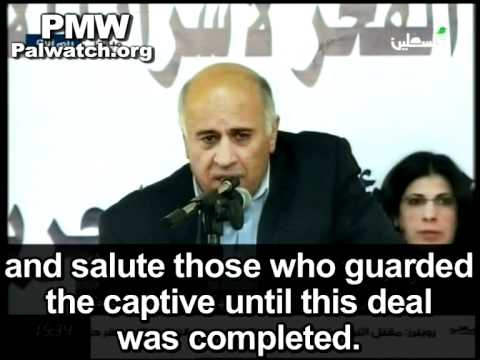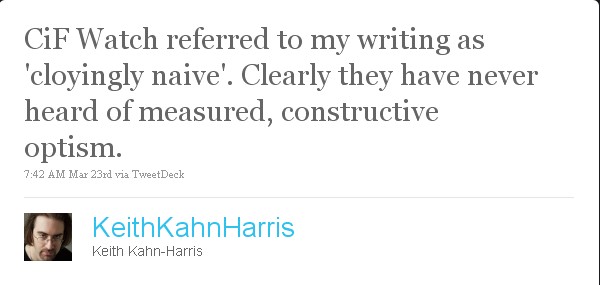h/t Jason
The BBC’s Gaza correspondent Jon Donnison took to the subject of football on October 7th.
Depicting the saga which began with the proposed attendance of Gilad Shalit at the match between Barcelona and Real Madrid, Donnison writes:
“Israeli officials put in a request to Barcelona FC, asking whether Mr Shalit could attend the game at the Camp Nou stadium.
The club said yes.
But when the news hit the media, some Palestinian groups called for Barcelona to withdraw their invitation and threatened a boycott.
Hamas officials in Gaza were quoted as saying Barcelona games would no longer be broadcast on television in the Palestinian coastal territory, without adding how they would go about stopping this from happening in practice.
Barcelona FC realised they had opened something of a can of worms.
Club officials quickly announced that it had also invited three Palestinian representatives to the game, including a Palestinian footballer who spent three years detained in an Israeli jail without ever being formally charged.”
According to the website of Barcelona FC, however, the initiative to invite three Palestinian representatives came from a different source:
” In the same manner as Mr. Shalit’s request was accepted, the Club has also accepted the Palestinian embassy’s request to extend three invitations to three Palestinian delegates. Musa Amer Odeh, Palestinian Authority ambassador; Jibril Rajoub, President of the Palestinian Football Union, and the Palestinian footballer Mahmoud Al Sarsak will also watch the Clásico at the Camp Nou. “
So in fact, invitee Musa Amer Odeh appears to have invited himself and two carefully selected others to the match.
Mr. Odeh (who apparently subscribes to some interesting versions of history) appears to be a fairly frequent visitor to the city of Barcelona, having been there only a few weeks previously in order to attend a welcoming event for the latest ship attempting to breach the naval blockade preventing the transport of weapons to the Gaza Strip.
Donnison continues:
“Mahmoud Sarsak, who has played for the Palestine national side, was eventually released in July this year after having been on hunger strike – taking only water and vitamins – for three months in protest at his detention.
Israel believes Sarsak is a member of the Palestinian militant group Islamic Jihad.”
“Israel believes” is of course merely a variation of the much-used phrase “Israel says” – often employed by journalists who, despite their obligations to present both sides of a story, choose to add weight to one particular ‘narrative’ by presenting the other as subjective.
In this case, it is not only Israel which “believes” that Mahmoud Sarsak is a Palestinian Islamic Jihad operative; the PIJ itself “believes” so too.
Hence, Sarsak was featured extensively on the Islamic Jihad’s ‘Saraya’ (military wing) website and, at the reception organized by that terror organisation for Sarsak upon his return to the Gaza Strip, Islamic Jihad leader Nafez Azzam praised him as “one of our noble members”. The picture below shows Sarsak – wearing a PIJ scarf – upon his arrival in Rafah in July 2012.

In fact, Mahmoud Sarsak himself does not deny that he had connections to the PIJ – as his appeal to the Israeli Supreme Court indicates:
“Following the last judicial review (on August 18, 2011) by Judge Oded Mudrik of the Tel Aviv District Court to approve the extension of Sarsak’s detention for an additional six months, Sarsak appealed to the Supreme Court. His main claim was that much time had elapsed since he was connected to the PIJM and its activities.”
This is not the first time a BBC journalist has attempted to downplay Mahmoud Sarsak’s connections to a terrorist organization. In June 2012 a BBC World Service sports broadcast featured an interview with Sarsak’s father which was promoted on the ‘World Football’ section of the BBC WS website using the following absurd claim:
“His father tells us how he believes his son’s imprisonment is an effort by Israel to destroy Palestinian football.”
In contrast to his whitewashing of Sarsak’s PIJ connections, Donnison has no commentary to make on the following quote from Sarsak which he chooses to use in his article:
” “I refuse to sit in the same place with a killer who came on a military tank,” the former prisoner said, referring to Shalit.”
Donnison then writes:
“The two other Palestinians offered tickets by Barcelona were Jibril Rajoub, a leading Fatah figure and head of the Palestinian Football Federation and also the Fatah dominated Palestine Liberation Organisation’s ambassador to Spain, Musa Amer Odeh.
When contacted by the BBC on Thursday, Mr Rajoub confirmed he and Ambassador Odeh would not be following Mahmoud Sarsak’s example and would be attending the game.”
Here again, Jon Donnison is being coy. Jibril Rajoub is of course far more than “a leading Fatah figure” and his CV includes much more than his position as head of the Palestinian Football Federation.
Rajoub – no stranger to terrorism and the resulting imprisonment himself – is also head of the Palestinian Olympic Committee and as recently as May 2012 used that position to volunteer to lead a campaign to have Israel expelled from the International Olympic community, declaring that sport is “one of the methods of resistance” against Israel. As head of the Palestinian Football Federation, Rajoub has campaigned against Israel’s hosting of the UEFA 2013 Under-21 championship in Israel.
In 2011, Rajoub represented the Palestinian Authority at a reception for Palestinian prisoners (many of them convicted terrorists) released under the terms of the Shalit deal, praising both the kidnappers of Gilad Shalit and the newly-released terrorists themselves.
[youtube=http://www.youtube.com/watch?v=QX81inAtc5E&feature=player_embedded]
If Donnison really wishes to inform his readers about the mixture of politics and football in the Middle East, he should at least play the whole 90 minutes and tell the story in its entirety – including the use of the sport as part of the delegitimisation campaign against Israel.
Related articles
- BBC coverage of recent rocket attacks on southern Israel (bbcwatch.org)
- BBC’s Jon Donnison on Salafists and Hamas (bbcwatch.org)
- Why Spain’s greatest football match matters to Palestinians (bbc.co.uk)
- BBC makeover: from Terrorist to Celeb (bbcwatch.org)
- BBC tunnel vision in Gaza (bbcwatch.org)
- BBC uses unverified quote to advance its narrative (bbcwatch.org)






